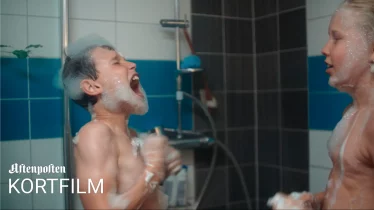
On 24 May 2023, a Greek newspaper article refers to a primary school teacher’s choice to show an “erotic film” in her classroom. Τhe truth could not be more different, as the aforementioned film is SHOWER BOYS by Christian Zetterberg. The moral panic and fake news that follows, result in a magnified media panic. For around 24 hours the news is reproduced in newspapers, television and social media.
Without the slightest verification of data, commentary on the “scandal film” circulates en masse. TV panels and articles feature “experts” on the subject who – without having seen the film – refer to its impact on children, and target the teacher who chose to screen the film from the Cinedu platform, recently created by the Greek Film Centre.
 Conservative circles have sought, with this coordinated fake news publication, to attack, on the one hand, the teacher who chose to openly address toxic masculinity and gender stereotypes in class. On the other hand, their aim is to question the possibility of the educational process being enriched not only with creativity and media, but also with themes related to equality and human rights, escaping the strict school agenda. All this effort was not unrelated to the fact that Greece was between two elections in those days.
Conservative circles have sought, with this coordinated fake news publication, to attack, on the one hand, the teacher who chose to openly address toxic masculinity and gender stereotypes in class. On the other hand, their aim is to question the possibility of the educational process being enriched not only with creativity and media, but also with themes related to equality and human rights, escaping the strict school agenda. All this effort was not unrelated to the fact that Greece was between two elections in those days.
The situation, however, begins to turn around and the truth comes out into the public sphere when a few journalists conduct the basic investigation. They report on the substance of the film, its content and awards (including the ECFA Short Award 2022), while opening up the debate about conservatism, toxic masculinity and homophobia that led to this turn of events.
 The statement released by Christian Zetterberg, who addressed the absurdity of the allegations, but also the essence of SHOWER BOYS, as a movie about “male friendship, how two best friends challenge masculinity norms” and “how their friendship gets both questioned and supported” was a catalyst at this point, demonstrating in the clearest way possible, the film’s connection to a child’s everyday life. Similarly pivotal was the intervention on behalf of ECFA, with the statement of its president Pantelis Panteloglou, who referred to children’s rights not only to explore their identity, but also to an inclusive education and access to art.
The statement released by Christian Zetterberg, who addressed the absurdity of the allegations, but also the essence of SHOWER BOYS, as a movie about “male friendship, how two best friends challenge masculinity norms” and “how their friendship gets both questioned and supported” was a catalyst at this point, demonstrating in the clearest way possible, the film’s connection to a child’s everyday life. Similarly pivotal was the intervention on behalf of ECFA, with the statement of its president Pantelis Panteloglou, who referred to children’s rights not only to explore their identity, but also to an inclusive education and access to art.
Such interventions opened a field of dialogue for the necessary debate on Children’s Rights, film education, sex education and beyond. This heated debate led to statements by teachers’ associations, LGBTQ+ organisations and human rights entities. Parts of the civil society also spoke up and through the prominence of progressive values and rights it was ultimately evident that conservative perspectives can not impose their rhetoric that easily on education and art. Discussions and events have already taken place, providing a first meeting point for teachers, artists and members of the civil society, and many other initiatives have been announced in this direction.
